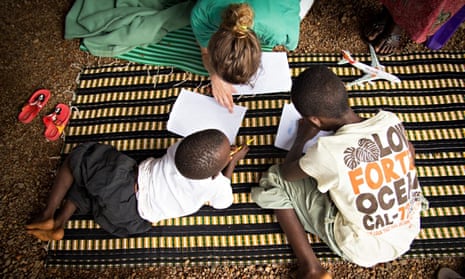Ebola is causing mental health problems in Sierra Leone, with the country’s overstretched health system unable to deal with the psychosocial legacy of the outbreak, according to a report by the International Medical Corps (pdf).
Fear, panic, stress, shame and isolation are increasingly common feelings, says IMC, an NGO that conducted interviews, focus groups and surveys in the town of Lunsar – the capital of Port Loko and one of the worst-hit districts in the country. The area was neglected in the earlier stages of the outbreak before IMC opened a hospital in December.
The NGO warns that psychosocial and mental health need to be considered part of the Ebola response in treatment facilities and community outreach, as well as in the longer term to make mental health an integral part of the country’s health system when it can rebuild.
The closure of hospitals, schools and businesses and the imposition of travel restrictions have caused psychosocial problems for communities, it said. With fewer opportunities in education and employment for young people, teenage pregnancies and consumption of alcohol are rising.
“Many of the issues that people reported are normal reactions to distressing events and many people will be able to recover with time,” said Georgina Grundy Campbell, IMC’s psychological coordinator and lead author of the report. “However, with reduced access to support systems and normal coping strategies in the communities, there is an increased risk that some people will develop mental health problems.”
She added that the health system in Sierra Leone “is not equipped to deal with large numbers of people seeking mental health support”.
Some interviewees said life had frozen or gone backward. Survivors at holding centres and in ambulances reported not being fed and being given only one drink a day; hydration is one of the main treatments for the disease.
They said staff were afraid to touch them and left medication in the corner of the room. One man nearly overdosed on paracetamol because he did not know how many tablets to take.
“Many survivors described being ‘sealed’ into the back of ambulances and driven around for hours picking up different people,” sometimes with dead bodies, said the report. Many said that on being discharged they were promised survival packages that never arrived. “They feel abandoned,” said IMC.
The loss of family members is causing pain and a challenging change of roles. One man said he was having to learn how to be a mother after his wife had died and “he does not know how to do that”.
Children and young adults left without parents are struggling to cope with becoming head of the household. “They admit they do not know what to do,” the report said.
Survivors, already stigmatised and isolated, are now more afraid of dying from malaria, typhoid or cholera, diseases that can share symptoms with Ebola but for which there is less care available as resources are diverted to tackling the outbreak.
The stigma has also depleted survivors’ economic power. Those who earned money by cooking before the illness cannot return to their livelihoods as customers call their cooking “Ebola food”. People have reported an increase in theft to make ends meet because petty trading is restricted.
According to interviews conducted by IMC, young women and men report an increase in teenage pregnancies because “there is nothing for young people to do” as schools are closed. For the same reason, young people say they are starting to drink alcohol.
The closure of schools and universities is a major challenge for the country. The president said in his New Year’s Day address that he hoped schools would reopen soon but they are unlikely to do so imminently in Port Loko, where the virus is not under control.
Daily life has been marred by the crisis, with women saying there is not enough money for food to feed their families and men saying that because “there is no work and no economy, you cannot go to work or distract yourself”.
The report says people affected by Ebola need additional support now and in the longer term to rebuild their livelihoods and adapt to new roles, regenerate social ties and use survivor networks.
Health systems will need rebuilding and strengthening in the longer term, including training doctors and nurses in treating mental illness such as anxiety, depression and post-traumatic stress disorder.
Kevin Noone, executive director of IMC in the UK, said the long-term effects of the Ebola crisis in west Africa are only just becoming apparent. “The mental health consequences need to be addressed now to prevent another crisis months down the line.”

Comments (…)
Sign in or create your Guardian account to join the discussion